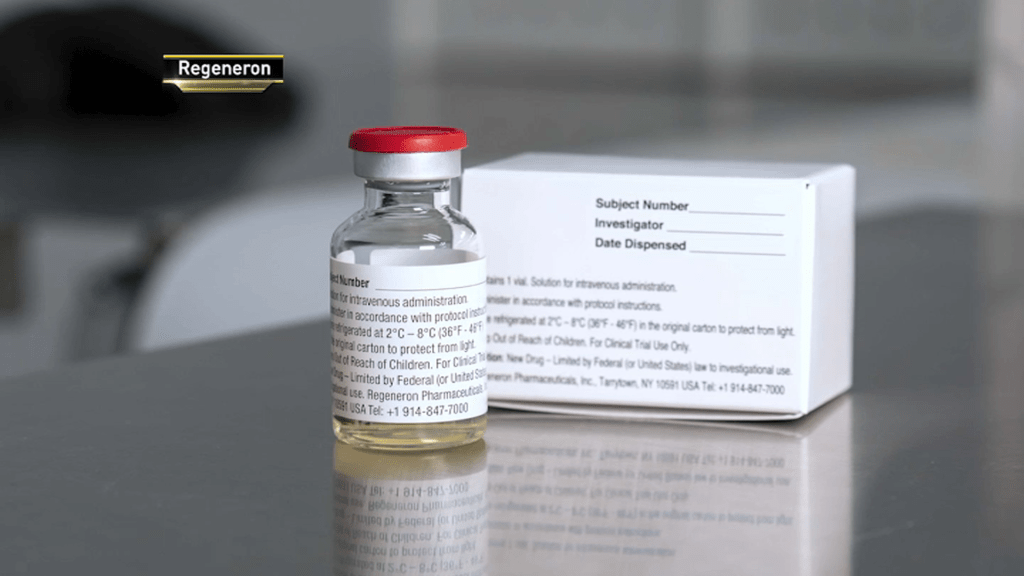
In a major development, the Biotechnology company Regeneron released some early results of tests using its antibody cocktail in coronavirus patients Tuesday and said it seemed to reduce levels of the virus and improve symptoms in patients, reports CNN.
It’s the same therapy that’s being used to treat the US President at the moment
The greatest improvements were seen in patients who hadn’t already mounted a natural response to the infection, the company said.
Promising Results?
The results only involve 275 patients of the 1,000 they have enrolled in this particular trial, but appear “very promising,” Dr. Jeanne Marrazzo, the director of the division of infectious diseases at University of Alabama at Birmingham, told CNN.
The treatment also showed positive trends at reducing medical visits for the patients, none of whom were sick enough to be hospitalized at the start of the trial, the company said.
The numbers in this early release of information were small and the data has not been peer reviewed yet. Only topline data was available in a news release from the company.
A company spokesperson said the data validates the treatment as a therapeutic substitute for a natural response to the virus.
What’s so interesting about it?

Marrazzo said what stood out to her is that the study characterized patients by their immune responses prior to treatment and determined who did and did not benefit.
“What I think is fascinating is that it shows that antibodies really matter and the antibody to the spike protein was really helpful, particularly when people made the antibodies themselves,” said Marrazzo.
“Whether it’s antibody therapy or vaccine that target these proteins, it sounds like we are on the right track. I think that’s really encouraging.”
reduces the virus in throats?
She was also encouraged by the reduction in the amount of virus in people’s throats, which could in theory reduce the risk of infecting others.
“If it plays out and you could treat people early and actually reduce the viral load in the nasopharynx, and they might be less infectious, that would be hugely helpful,” said Marrazzo.
Further Details Needed
Because the company released the information in a news release and not as a scientific report, it’s unclear who was enrolled in the study and how reflective they were of the population. The treatment would have to be tested in many more people to know for sure how well it works. Scientists will also want to know more about how many patients who got the treatment needed to be hospitalized.
“We don’t have that information today, but we will,” Dr. Leonard Schleifer, co-founder of Regeneron, told CNN. “We have already learned that hospitalized patients have even higher viral load, suggesting they’re not attempting an adequate immune response. So we would hope we’d be able to see the same thing with those patients.”
Schleifer is “very encouraged” by these early results.
“It came in exactly the way we expected it to work,” Schleifer said.
No Safety Concerns in the Data
Dr. Claudia Hoyen, an infectious disease specialist with University Hospitals Cleveland Medical Center, also sees the results as “promising.” The data doesn’t show any safety concerns, she said, and the preliminary data looks good so far.
“It seems safe, and it seems to be headed in the right direction in terms of decreasing the virologic load and, looks like there’s some preliminary correlation with fewer symptoms and less hospitalizations,” Hoyen said.
“But again, they still have a lot of patients to get through to know for sure.”
The Cocktail Approach is Effective?
Jennifer Gommerman, a professor of immunology at the University of Toronto, also used the phrase “really promising.”
She said that, along with Regeneron’s earlier work published in a peer-reviewed journal in August, the additional key takeaway is that the “cocktail” approach is effective.
A cocktail antibody therapy uses two or more lab-engineered antibodies.
Regeneron’s cocktail includes a monoclonal antibody that targets the spike protein the virus uses to drill into healthy cells, and another antibody that targets a different part of the novel coronavirus. With two, the hope is is to trap and shut down viral replication.
“It appears that they’ve got positive results and that this antibody cocktail doses reduce the amount of time that the patients are sick, especially the patients that weren’t able to mount their own antibody response,” Gommerman said.
“They’re obviously going to have to do much more human experiments and bigger trials to really make sure.”
Dr. Richard Besser, a former acting CDC director who now heads the Robert Wood Johnson Foundation, said it makes sense that a treatment that gives a patient antibodies would help the immune system, but he said peer review will find any holes or pitfalls.
“I would withhold judgment on this until we see the data,” said Besser. “You know these early results that keep coming out from companies in press releases strike me as being about much more, much more about the stock price than they are about science.”
Gommerman, Marrazzo and Hoyen think antibody treatments could be a real help in patient populations that don’t generate a real robust immune response to a vaccine, like patients in nursing homes or other elderly people. The treatment may also be helpful in the transition period, before everyone can get vaccinated.
Regeneron isn’t the only company working on an antibody treatment. Eli Lilly is also in late stage trials with its antibody treatment. There are at least 70 different antibody treatments under investigation according to BIO, an association that represents major biotechnology companies.
More Data To Be Available Soon
Regeneron said that there will be more data to come from this trial, from a trial involving hospitalized patients, and one that is testing the antibody cocktail as a prevention for people who have contact with someone in their household who has Covid-19.
In Talks for Emergency Authorization
Schleifer said Regeneron is in talks with regulators about these results to see if the US Food and Drug Administration would consider an emergency authorization of the drug. They have additional data the company will submit for formal approval.
Regeneron co-founder George Yancopoulous said during a call with shareholders Tuesday that it is up to regulators to decide if this is enough information to make this therapeutic intervention available sooner to patients who might need it.
“I think that this deserves to be discussed with regulatory authorities, because of all of the societal implications,” Yancopoulous said.
“We think that there’s a lot of evidence here to suggest that this is a therapeutic solution that could really benefit quite a number of individuals and patients.”
Did you subscribe to our daily newsletter?
It’s Free! Click here to Subscribe!
Source: CNN
















